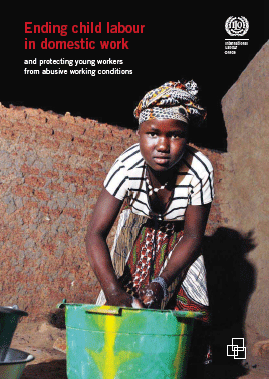Ten million child labourers in domestic work
 «To mark World Day Against Child Labour, the International Labour Organization (ILO) publishes a report outlining the abuses suffered by millions of children working in family homes.»
«To mark World Day Against Child Labour, the International Labour Organization (ILO) publishes a report outlining the abuses suffered by millions of children working in family homes.»
«Millions of children around the world, mainly girls, are in paid or unpaid domestic work in households other than their own. Of these children around two thirds are estimated to be in unacceptable situations, either because they are below the legal minimum working age, or are working under hazardous conditions or in circumstances that are tantamount to slavery.
These children carry out tasks such as cleaning, ironing, cooking, gardening, collecting water, looking after other children and caring for the elderly. Many of them have no or insufficient access to education. When undertaken in their own homes, in reasonable conditions, and supervised by those closest to them, such chores can be an integral part of family life and of growing up. While there are concerns over certain situations where these workloads, in their own home, interfere with the children’s education or are excessive, such situations are not the subject of this report. What is of concern here is the seclusion, dependency and lack of rights that make children working in the homes of others highly vulnerable to child labour.
The ILO’s fundamental child labour Conventions, namely Convention No. 138 concerning the minimum age for admission to employment and Convention No. 182 on the worst forms of child labour, provide the framework for ending child labour in domestic work. Children should not be working at an age below the general minimum age for employment, or in worst forms of child labour situations, such as in hazardous work or slavery. At the same time, where young workers have reached the minimum age for work and are legally permitted to work, special attention should be paid to ensure that their working conditions and environment are age-suitable, take account of their specific needs, and prevent their situation from becoming hazardous.
- Login or register to post comments
- Français
 Recommander cette page à un(e) ami(e)
Recommander cette page à un(e) ami(e)